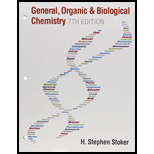
Concept explainers
(a)
Interpretation: To identify whether gastrin is a hormone, a digestive enzyme or neither a hormone nor a digestive enzyme.
Concept introduction: Enzymes are specialized proteins that act as biological catalysts. Enzymes accelerate the biochemical reactions to produce the substances that are needed for cells for their proper functioning. The enzymes are very specific to their action.
Hormones are the chemical signals and these are produced by specialized cells. Hormones are secreted into the blood stream and carried to a target tissue where they signal the targeted tissue or organ to perform their specified function.
(b)
Interpretation: To identify whether trypsin is a hormone, a digestive enzyme or neither a hormone nor a digestive enzyme.
Concept introduction: Enzymes are specialized proteins that act as biological catalysts. Enzymes accelerate the biochemical reactions to produce the substances that are needed for cells for their proper functioning. The enzymes are very specific to their action.
Hormones are the chemical signals and these are produced by specialized cells. Hormones are secreted into the blood stream and carried to a target tissue where they signal the targeted tissue or organ to perform their specified function.
(c)
Interpretation: To identify whether
Concept introduction: Enzymes are specialized proteins that act as biological catalysts. Enzymes accelerate the biochemical reactions to produce the substances that are needed for cells for their proper functioning. The enzymes are very specific to their action.
Hormones are the chemical signals and these are produced by specialized cells. Hormones are secreted into the blood stream and carried to a target tissue where they signal the targeted tissue or organ to perform their specified function.
(d)
Interpretation: To identify whether carboxypeptidase is a hormone, a digestive enzyme or neither a hormone nor a digestive enzyme.
Concept introduction: Enzymes are specialized proteins that act as biological catalysts. Enzymes accelerate the biochemical reactions to produce the substances that are needed for cells for their proper functioning. The enzymes are very specific to their action.
Hormones are the chemical signals and these are produced by specialized cells. Hormones are secreted into the blood stream and carried to a target tissue where they signal the targeted tissue or organ to perform their specified function.
Want to see the full answer?
Check out a sample textbook solution
Chapter 26 Solutions
Bundle: General, Organic, and Biological Chemistry, 7th + OWLv2 Quick Prep for General Chemistry, 4 terms (24 months) Printed Access Card
- A unit used in photochemistry is the einstein. If 400 kJ mol-1 of energy has been absorbed, how many einsteins is this equivalent to?arrow_forwardFor the condensation reaction between Alanine and histidine write the amididation reaction mechanism using arrows then write the three letter code for the product of the reaction and the one letter code for the product of the reaction.arrow_forwardWrite the amididation reaction mechanism of p-aminophenol and acetic acid to produce acetaminophen please use arrows.arrow_forward
- Write the amididation reaction mechanism of a-aminophenol and acetic acid to produce acetaminophenarrow_forwardFor the condensation reaction between Alamine and histamine, please help me write the amididation reaction mechanism. Then write the three letter code for the product of the reaction, then write the one letter code for the product of the reaction. arrow_forwardHow to draw the reaction mechasnism belowarrow_forward
- Name the following molecules with IUpacarrow_forwardWhat is the molecular orbital for cyclopropenyl anion and is it aromatic, antiaromatic or nonaromatic?arrow_forwardUsing the chart describe the change from cystine to tyrosine and its impact on the protein. Using the chart describe the change from histidine to aspartic acid and its impact on the protein.arrow_forward
 General, Organic, and Biological ChemistryChemistryISBN:9781285853918Author:H. Stephen StokerPublisher:Cengage Learning
General, Organic, and Biological ChemistryChemistryISBN:9781285853918Author:H. Stephen StokerPublisher:Cengage Learning Organic And Biological ChemistryChemistryISBN:9781305081079Author:STOKER, H. Stephen (howard Stephen)Publisher:Cengage Learning,
Organic And Biological ChemistryChemistryISBN:9781305081079Author:STOKER, H. Stephen (howard Stephen)Publisher:Cengage Learning, Introduction to General, Organic and BiochemistryChemistryISBN:9781285869759Author:Frederick A. Bettelheim, William H. Brown, Mary K. Campbell, Shawn O. Farrell, Omar TorresPublisher:Cengage Learning
Introduction to General, Organic and BiochemistryChemistryISBN:9781285869759Author:Frederick A. Bettelheim, William H. Brown, Mary K. Campbell, Shawn O. Farrell, Omar TorresPublisher:Cengage Learning Chemistry for Today: General, Organic, and Bioche...ChemistryISBN:9781305960060Author:Spencer L. Seager, Michael R. Slabaugh, Maren S. HansenPublisher:Cengage Learning
Chemistry for Today: General, Organic, and Bioche...ChemistryISBN:9781305960060Author:Spencer L. Seager, Michael R. Slabaugh, Maren S. HansenPublisher:Cengage Learning



